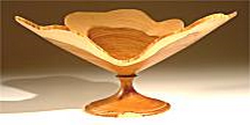Copy of `Turning Tools - Glossary of Woodturning Terms`
The wordlist doesn't exist anymore, or, the website doesn't exist anymore. On this page you can find a copy of the original information. The information may have been taken offline because it is outdated.
|
|
|
Turning Tools - Glossary of Woodturning Terms
Category: Agriculture and Industry > Woodturning
Date & country: 01/03/1999, UK
Words: 122
|
Shell augur bitUsed for drilling long holes on the lathes, eg in electric lamp stands.
Sizing tool (or Hook gate)A hook shaped attachment to a square parting tool which enables the workpiece to be sized to a pre-set dimension. This is particularly useful when an operation of this sort has to be performed repeatedly.
Skew chiselA chisel on which the cutting edge is not square to the sides of the tool.
Spalted woodWood which is in the first stages of fungal decay, ie rot. Very often it is made manifest by irregular dark, or black, lines which run through the material. It is most common in beech but is found in many other hard woods. The fungae require damp conditions in which to grow; when the wood is dried (below about 20% MC) the fungae die and the process ceases.
SpigotA parallel projection on the end of a workpiece which is made to fit into a recess of some kind, eg a socket in a chair seat or in a spigot chuck.
Spigot chuckSee cup chuck.
Spindle gougeUsed for shaping spindle work, eg for turning beads and coves. It has a cross section with a shallow arc; so is sometimes referred to as a shallow fluted gouge. The cutting edge is usually ground to a finger nail shape with a 30° - 40° bevel angle.
SplitA longitudinal fissure in the wood. Terminology may vary from place to place but there can be said to be two types of split: namely, shakes and checks. Shakes can occur in three main ways:
-in the living tree, possibly due to wind stress;
-at the time of felling, due to impact; and
-shrinkage in the log before conversion. Checks occur after conversion of the log and are due to shrinkage whilst the material is drying. See also: cup shake, heart shake, star shake, end check, surface check, through check and honeycomb.
Split turningA technique used where two identical semicircular items are required. One method is to make a complete turning from solid stock and then saw the piece in half. A better way is to glue two pieces of stock together with a leaf of paper in the joint and then make the turning. When the turning is complete the paper allows the pieces to be separated.
Square (wood)A sawn piece of timber which is roughly square in section and ready to be used in spindle turning.
Square nose chiselA chisel on which the cutting edge is square to the sides.
Star shakeA group of splits running away from the pith in the form of a star.
Surface checkA split on the surface of the wood.
TailstockThe movable assembly to the right of the headstock which slides along the bed.
TangThe tapered end of a woodturning tool which fits into the handle.
Through checkA split which extends through a board from one surface to the other.
TicketerA round piece of metal used to form a burr.
Tool rest (or T rest)Adjustable part of the lathe (usually a 'T' shape) which fits into the banjo and supports the turning tool whilst work is in progress.
Waney edgeA natural edge left by the outside of the tree on a sawn board.
Wire edgeSee burr.
M.C.See moisture content.
M.T.See morse taper.

